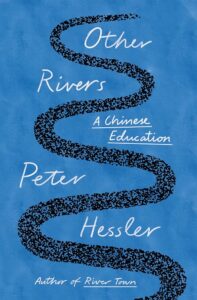Book Review | Other Rivers: A Chinese Education, by Peter Hessler
 Other Rivers: A Chinese Education
Other Rivers: A Chinese Education
by Peter Hessler
Penguin Press (July 9, 2024); 464 pages
Available on Amazon – $19.21 (Hardcover) or $14.99 (Kindle)
Reviewed by Clifford Garstang (Korea, 1976-77)
I have been an admirer of Peter Hessler’s work since reading his first book, River Town, about his Peace Corps service at a Chinese university in the 1990s. I was particularly drawn to that book because of my own Peace Corps work in a Korean university twenty years earlier and also because my eventual professional life took me to China frequently. Hessler wrote eloquently about his Peace Corps experience in a way that I think any RPCV could relate to.
Hessler’s subsequent books about China, Oracle Bones and Country Driving, written while he was a journalist in Beijing, were fascinating accounts of other aspects of life in China, in which Hessler himself was a prominent character. All three of the books, his China Trilogy, were written with such clarity and charm that they reached a wide audience, including within China.
Other Rivers: A Chinese Education, Hessler’s latest book about China, is just as interesting and satisfying as the others. Here he recounts his return to teaching in 2019, this time at Sichuan University in Chengdu, Sichuan, while taking a break from writing. He discovers that a great deal has changed since he was a Peace Corps Volunteer more than twenty years earlier: his students are not as poor as his previous students had been; they have different worldviews and ambitions; and the rise of Xi Jinping, China’s leader, has also created a different, more repressive atmosphere that inhibits expression but also inspires creative methods of resistance.
By staying in touch with his students from his Peace Corps days and comparing their progress and attitudes to his more recent students, Hessler has created a robust portrait of the evolution of education in China, one that has a human face. The stories that both cohorts of students tell now help readers understand the country’s progress and its continuous political upheavals.
Also, Hessler’s time in Sichuan is tumultuous because of the arrival of the COVID-19 pandemic. Not only does he have to adjust his teaching when China orders the initial lockdown, his twin daughters, who were enrolled in a Chengdu public elementary school, also have to adjust. Their story is fascinating because the girls, whose mother is Chinese American, had no knowledge of Mandarin when they entered the school, so they face considerable obstacles anyway, and the pandemic just makes it harder. Seeing the response to the pandemic from the Chinese perspective is enlightening, and not just because the virus originated there, in the city of Wuhan, but because, at first, the Chinese government was far more successful than Western governments in dealing with the crisis.
During this period, Chinese American relations became strained because of President Trump’s hawkish trade policies. It was not clear at first what would happen to the businesses catering to the U.S. market during the pandemic and the added strain of Trump’s tariffs, but Hessler documents the ability of Chinese entrepreneurs to adapt. One business owner he spoke to wasn’t concerned about Trump as the 2020 U.S. election approached. “’I don’t think it’s important who gets elected,’ he said, explaining that even the Trump trade war didn’t affect his business. In response to the tariffs, [he] had simply raised his Amazon prices by 15 percent. ‘The tariff is paid by the customer,’ he said.”
In many ways, Other Rivers is an update to Hessler’s first book, one that not only reports on China’s education system but also, tapping into Hessler’s talents as a journalist, provides another up-close study of contemporary China. The country has made great strides since Hessler first arrived there, but it has also suffered from deepening repression. When, at the end of the book, Hessler’s teaching contract is not renewed so that he and his family have to leave the country, no one should be terribly surprised.
Reviewer Clifford Garstang is the author of In An Uncharted Country, a collection of short stories, which won the 2010 Maria Thomas Fiction Award from Peace Corps Writers. His novel in stories, What the Zhang Boys Know, won the 2013 Library of Virginia Literary Award for Fiction. He is also the editor of Everywhere Stories: Short Fiction from a Small Planet, a three-volume anthology series featuring stories set around the world, including work by several Returned Peace Corps Volunteers. He is also the author of the story collection, House of the Ancients and Other Stories, and three novels: The Shaman of Turtle Valley, Oliver’s Travels, and, most recently, The Last Bird of Paradise. In the Peace Corps, Garstang taught English at Chonbuk National University in Chonju, South Korea. He practiced international law for many years and now writes full time. https://cliffordgarstang.com/
No comments yet.
Add your comment